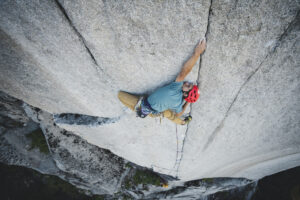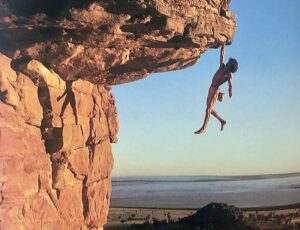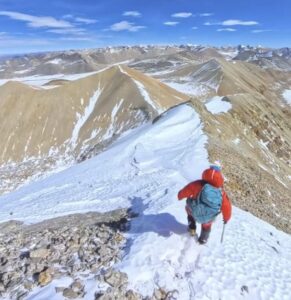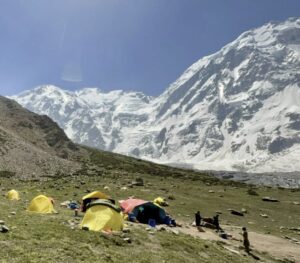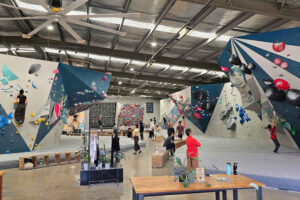There’s something to be said for pursuing your limits. The immediate result isn’t always pretty, but you can’t underestimate the long-term benefit of a smackdown. Experience and humility go hand in hand — in climbing, failure must be a tool rather than a deterrent.
Enter Patrick Tirler. The South Tyrolean traveled to Kyrgyzstan with Moritz Platt and Moritz Sigmund to climb the same wall where paramilitary operatives kidnapped Tommy Caldwell and Beth Rodden in 2000. Tirler and the team came away from the month-long expedition with a few early defeats, and one ringing, final success.

The Karavshin Valley. Yellow Wall on the right, Peak Asan on the left. Photo: Chris Harkness
The group arrived in Kyrgyzstan’s Karavshin Valley in late August, seeking first ascents on the Yellow Wall. The valley offers an impressive cirque: just opposite the big granite shield, the spiky Peak Asan towers above at 4,016m.
Pristine weather prevailed and the cliffs beckoned. Right away, the climbers got down to business. A warmup outing on a 500m, 7a route called “Diagonal” turned out to be a romp. They on-sighted it and immediately planned a stiffer challenge.
“We came with high expectations and the weather on the first days was perfect. Already on the third day in the valley, [we] couldn’t hold back our over-motivation, so we prepared our haul bags to attempt a new route through the headwall of the Yellow Wall,” Tirler wrote on Instagram.
The new line was not to be. Logistical snafus frustrated Tirler and Platt, and exposed their inexperience.
“We massively underestimated the logistics and the weight of the haulbag. We suffered the whole day, but we could climb the first half of the wall on an already existing route,” Tirler reported. “On the second day, we left all the bivy gear behind and started into the headwall on a new line.”
That’s when the trouble really started. A crack too wide to accept the climbers’ biggest gear (a cam built to fill a space nearly as wide as two fists) proved too difficult.
“We were mentally and physically destroyed and decided to give up. During these two days, we realized that we are bloody beginners in big-wall climbing and that we need new tactics to enjoy climbing,” Tirler acknowledged.
Soon after that, Tirler got sick. He spent a week “doing nothing”. How Sigmund and Platt passed the hours is unclear. As Tirler’s condition started to improve, the fair weather in the Karavshin broke and rain began to fall.
But when it stopped, Tirler was ready. And most big-wall climbers know that what he and Sigmund did next likely made it all worthwhile.
“When the weather got a little better, my motivation was at its maximum,” Tirler wrote.
Psyched, the duo walked up to the base of Little Asan (just past Asan Peak) and racked up.

Peak 4810 (centre background), Asan Peak (right foreground), and Little Asan (left foreground). Photo: Patrick Tirler
“Our route became much better than expected. We were amazed by the beautiful rock features and very happy about our new route, but it was very unsure if the route [was] even possible to free climb,” Tirler wrote.
Their anxiety was properly founded, but they eventually overcame every crux and established what looks like a pristine mountain route. “Ak-Kalpak” goes free at 8a+, 11 pitches, 280m to the Little Asan summit. Steep crack climbing on thin fissures and dimpled granite defines the new line.
The effort took two days. Tirler credited Phil Geisler, of Tyrol, Austria, with helping decipher the cruxes.
“Ak-Kalpak” testifies to teach any climber a critical lesson: You’d better not sit around and sulk if you get routed. You never know when your next great opportunity will surface.

